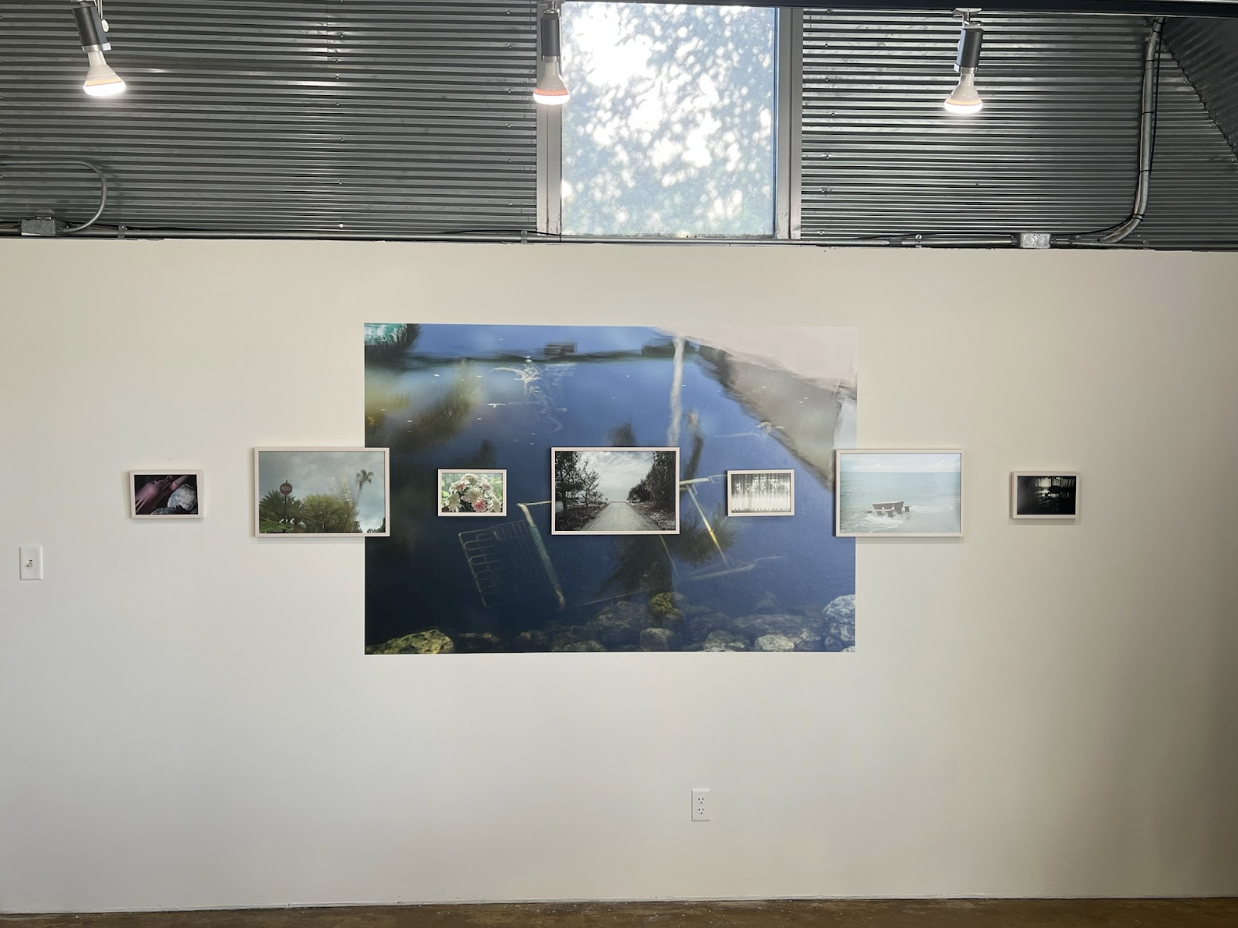Easy Listening
Rosalie Rosenthal at Quonset Hut
Photo courtesy of Matthew and Mitchell Bradley
Entry, 2022, Rosalie Rosenthal
Amongst the pastel blues and coastal grays of Rosalie Rosenthal’s Easy Listening lie troubled vistas. Beneath the sterility of the beachfront rental and banality of leisure, something darker lurks. Easy Listening reads like a narrative from left to right, the human form giving way to a landscape. From disembodied limbs in states of idleness to the environment, both natural and built, the impermanence of what has so long been taken for granted is hauntingly apparent.
Easy Listening is a tragedy in three acts. First, the quintessential Floridian homes in Daybreak (2022) and Entry (2022) imposed upon a wall of palm fronds (Palms) set the scene–inoffensive, lush, and manmade. In her statement, Rosenthal notes that these were taken in Naples, a town on the southwestern coast of Florida whose extensive marshlands were dredged and developed in the mid-20th century.
A sandy pile of synthetic turf lies discarded, contrasting sharply with polished interior photographs. Something is wrong here, as evidenced by the bodiless limbs in Ennui (2025) and Langour (Unknown). These interiors are almost too sterile, too serene; the bodies that inhabit them weary. The incredible operatic Sun and Sea (Marina) comes to mind here: bodies splayed out across an artificial beach, repose interrupted–just for a moment–by observations of our rapidly changing planet.
These places that once stood still, a time capsule of the post-war economic boom, are changing before our eyes. The last act, punctuated by Ditch (2025), underscores this. The uneasy tension between everyday banality and catastrophic disaster are punctuated by this final act, where dreamy flower bouquets and light filtering through curtains linger amongst a picnic table washing into the sea and road signs reflecting on high water.
Personally, Rosenthal’s work tugged at a feeling that I’ve struggled to name or categorize. It made me wonder: What does it mean to mourn someplace we are merely visitors to? At 31, I’ve spent almost every year of my life visiting the same town in North Carolina’s Outer Banks as part of a beloved family tradition. The beaches have started to feel smaller, and it’s not because I am no longer a child. Like all coastal regions, the Outer Banks face a significant threat from rising sea levels. In 2024 alone, six houses on Cape Hatteras collapsed into the ocean and, as this is being written, Hurricane Erin caused the first structure collapse of 2025. Watching this place get washed into the ocean, a place that I didn’t quite call home but have so many memories attached to is complex–sadness, survivor’s guilt, and a selfish relief mingle simultaneously.
Hide, 2022, Rosalie Rosenthal
This feeling is only fleeting, however, as vacation demands distraction. We only get so much time off work, no need to worry too much. And between the gin and tonics, family meals, and sunscreen applications, it’s difficult to notice the little reminders that the world as we know it is growing more and more unrecognizable. As we settle back into our post-vacation routines, climate anxieties find less room to capture our attention. “How was your vacation?” questions are answered positively, maybe accompanied by a sunburn story. It’s generally frowned upon to mention the terrifying rate of coastal erosion or the fact that the ocean shouldn’t have felt as warm as bathwater. No, vacation isn’t the time or place to analyze the ways in which greenhouse gas emissions–the very same that brought us to our destination–have tipped our warming planet past the point of no return.
Suddenly, the blue-green curtains in Hide (2022) take on less of an aesthetic and more of a function. Like the inoffensive hospital linens meant to soothe anxious patients, they evoke calming memories of gentle waves and soft breezes. Contrasting coral accents evoke reefs that are disappearing under increasingly acidic, warm waters. The coastal aesthetic is shifting–like the barrier islands it is modeled after–from that of a reflection of the outdoors to merely a memory. The body, anonymous and in a state of stillness (whether by leisure or illness–reasons are unclear) is a reminder of our impermanence on this planet, and, oddly, it feels comforting. For however many changes we see in our (relatively) short lifetime, this planet of ours has seen tenfold, and will continue to do so long after we are gone.
Anna is on the Kudzu jelly Board of Directors as of the publishing date of this article. She was not financially compensated for this piece.




